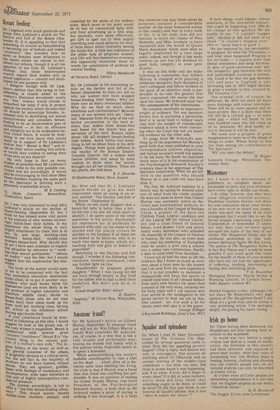Squalor and splendour
Sir: When I read M. Marc Girouard's review of The Victorian City (September 8), several questions came to mind. How did the appalling poverty happen? (This is fairly well known but only in retrospect). Did anyone do anything about'it? (Missions and an uneasy stirring of the middle-class conscience — too little, too late). Did those in power know it was happening, and, if so when, if ever, did it begin to worry them? If it did, at some moment, worry them did they think that something ought to be done or could be done? Or did they just think, to use General de Gaulle's phrase, that it was "dcrns la nature des choscs '?
If such things could happen, almost unawares, in the nineteenth century, they could be happening now. (We do not change all that quickly). We are unable to say " it couldn't happen here," because it did, but most of us think " it couldn't happen now," (We've "never had it so good We are bemused by the inevitability
of progress. So were the Victorians — and look what happened! Progress is not inevitable — it requires more than liberal sentiments and soup kitchens. In spite of good intentions and 'aid,' the prosperity gap between the rich and undeveloped countries is increasing. Could it be that the gap between rich and poor in England is also increasing and by 2073 might become as great a scandal as that revealed by The Victorian (Ver.!
The scandal will, of course, be different. By 2073 we shall all have main drainage and colour television. There will be no more squalor and no more poverty. But it is likely that there will still be a cultural gap — or some other gap — which will fester. In the next hundred years this will creep up on us, unawares. We shall hardly notice it, because it will be new.
We need now a prophet of great imagination to warn us of the shape of things to come. Where better to find one than among the contributors to The Spectator?
Will you open the debate?
M. Hepper Lismoyle Cottage, Wittersham, Tenterden, Kent


































 Previous page
Previous page